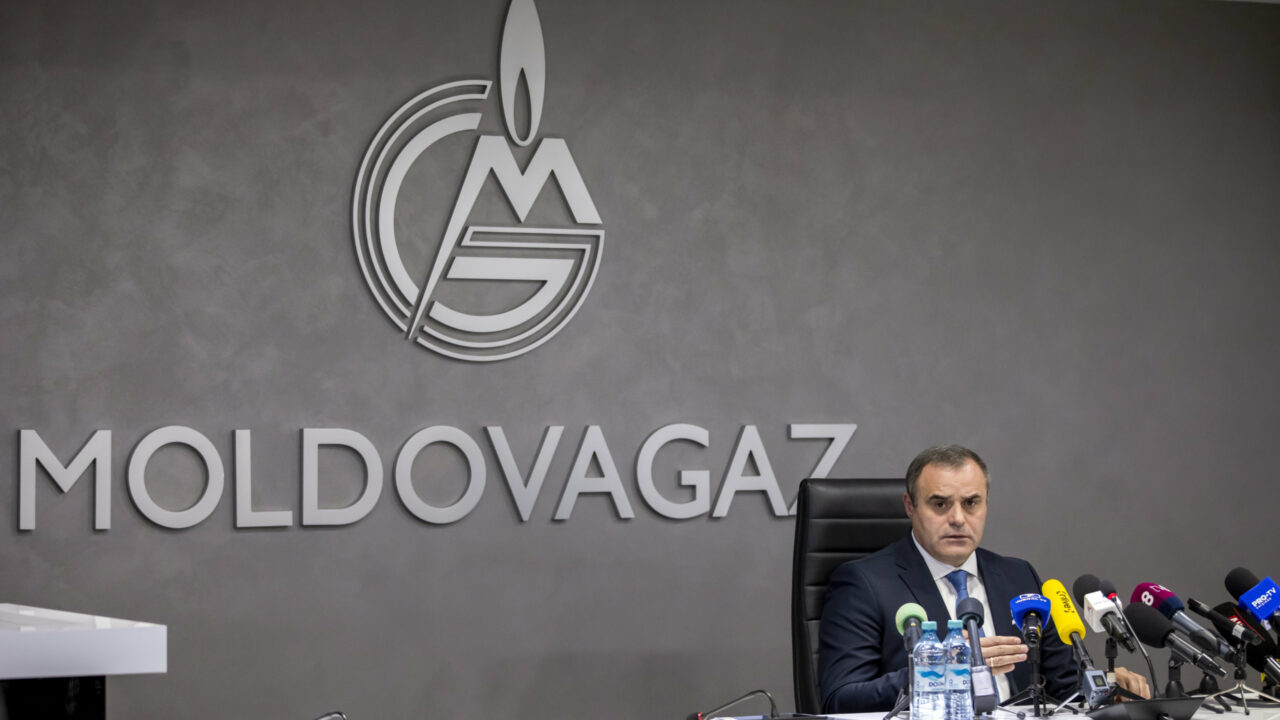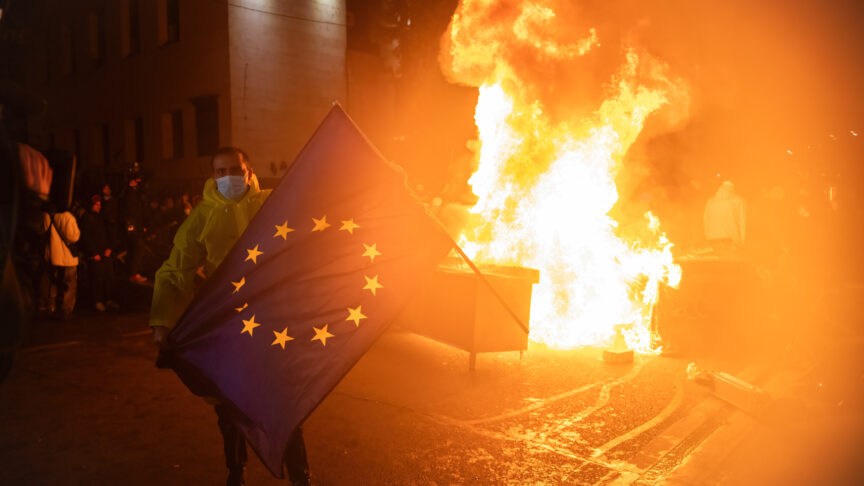The final frontier: Ending Moldova’s dependency on Russian gas
Over the past year, Moldova has rid itself of Russian gas supplies. But it still receives electricity from the Russian-sponsored breakaway region of Transnistria. Ending this final dependency would bolster Moldova’s security – and Europe’s
Before Russia’s full-scale invasion of Ukraine, Moldova was one of Europe’s most dependent countries on Russian energy. But over the last year, Moldova has managed to achieve full independence from Russian gas, develop alternative supply routes, unbundle the energy market, and disprove its debt to Russian majority state-owned gas company, Gazprom. These manoeuvres have foiled Russia’s ‘gas blackmail’ efforts in all but one region – the breakaway region of Transnistria in the country’s east.
Although internationally recognised as part of Moldova, Transnistria operates via a semi-autonomous administration, which Russia sponsors with a military presence and energy schemes. Notably, Gazprom supplies gas free-of-charge to the Russian-owned Cuciurgan electricity plant in Transnistria. This electricity is then sold to Moldova, making up around 70 per cent of the country’s power supply.
Ending this last dependency is key to undermining the Kremlin’s Transnistrian ‘project’, aimed at keeping Moldova away from the European Union and potentially NATO via control of the separatist region. Achieving total energy independence would therefore not only strengthen Moldova’s security but that of Europe – particularly considering the country’s EU candidate status.
In line with its modus operandi, Russia has long deployed energy as a geopolitical weapon in Moldova: In October 2021, just a few months after President Maia Sandu’s pro-EU party, Action and Solidarity, won the parliamentary election, Gazprom demanded Moldova pay a debt it claimed stood at over $700m, as well as a higher price for gas supplies, otherwise it would not sign a new supply contract. Then, amid Russia’s full-scale invasion of Ukraine in February 2022, Gazprom reduced its gas supplies to Moldova by 30 per cent, including to Transnistria. This led to a shortage of gas and a reduction in electricity production at the Cuciurgan power station. At the same time, Russian strikes on energy infrastructure in Ukraine stopped Ukrainian exports to Moldova, causing Moldova to fall short of sufficient gas and electricity supply.
By reducing the gas supply and subsequently increasing consumer prices, the Kremlin hoped to undermine Moldova’s pro-EU leadership and increase support for pro-Russian alternatives. And making a deal with Gazprom to increase gas supply would have heightened Moldova’s vulnerability to Russian demands for political and military support in its war: Not only did Moldova need to keep the lights on and houses warm, but it needed to do so without Russian energy.
Not only did Moldova need to keep the lights on and houses warm, but it needed to do so without Russian energy
Chisinau responded to this Russian-induced energy crisis proactively. With the support of European financial institutions, Moldova purchased emergency gas supplies and was just about able to get through the winter. These supplies were not cheap, but such was the price of independence. And, to cushion the unpopularity of such a move, the government subsidised the higher energy prices for the most vulnerable consumers.
For this coming winter, Moldova has already reserved the amount of gas needed from European suppliers, and at a better price than the one offered by Gazprom. This could decrease prices for consumers and ease pressure on the current government and its pro-EU agenda. In doing so, the government showed that it learned its lesson from last winter and that it can live without Russian gas – an assumption that prior to this year, no Moldovan government was willing to challenge.
In September this year, Moldova advanced this separation in two key ways. First, after many years of delay, Moldova’s gas transmission network, which was managed by Moldovatransgaz, the part of Moldovagaz controlled by Gazprom, was handed over to Vestmoldtransgaz. The latter is owned by Romanian Transgaz and the European Bank for Reconstruction and Development. This unbundling of the Moldovan energy has depleted the Kremlin of another instrument of ‘gas blackmail’. Second, Moldova finalised an independent audit of the so-called historic debt of Moldovagaz to Gazprom. The audit showed that the claimed debt – which had increased to more than $800m by September this year – was groundless, aside from a mere $8.6m. These actions leave Russia almost without leverage in the energy sector of Moldova, which is why Russia will likely challenge the decisions of the Moldovan government and the results of the audit.
But, despite this newfound independence from Russian gas, Gazprom’s free-of-charge supply to the Russian controlled Cuciurgan plant in Transnistria keeps Moldova’s electricity supply dependent on Russia. This also allows Russia to sponsor the separatist region by generating cash flow for the Transnistrian administration through the sale of electricity without paying for the gas – the dividends of which make up around half of the region’s budget. If disconnected from Russian gas, it would take months if not weeks for the regime to go bankrupt, creating a moment of truth for Moldova’s efforts to reintegrate the region.
To survive such a scenario, Moldova needs to have alternative electricity supplies ready. Sourcing electricity from Romania or Ukraine is highly problematic since the only high-voltage line between these countries and Moldova passes through the Transnistria region, meaning Chisinau would still depend on Russia via Transnistria. However, Moldova, together with the European Investment Bank, is currently building a high-voltage line that directly connects its electricity grid with that of Romania, which is scheduled to be ready in 2025. This will give Moldova greater flexibility to challenge Russia, including in Transnistria. As one Moldovan official put it, “in 2025, the Russian coach turns into a pumpkin.”[1]
The Moldovan government’s de-weaponisation of Russian energy supplies has, in part, allowed it to challenge Russian influence and conduct a bolder foreign policy, especially by being more vocal on Chisinau’s support for Ukraine and calling for more support for Kyiv to regain control over its territories. But the country still faces security significant threats from Russia. In February, Sandu accused Russia of planning a coup, adding at a CEPA forum that, “Russia wants to keep us in the grey area. Russia wants to be able to use Moldova against the West and against Ukraine.” Achieving energy independence from Russia – if the alternative supplies are secure and the electricity interconnection with Romania and the EU takes place – would pose a serious threat to the Russian-sponsored breakaway region of Transnistria, and further shore up Moldova’s security. As such, European leaders should continue to support the country’s plans for alternative electricity supply so it can effectively sever all ties with Russian energy and influence – including in Transnistria. A suitable mechanism for this is the Moldova Support Platform – an initiative of Romania, Germany, and France – which has become an engine for overcoming the repercussions in Moldova of the Russian war against Ukraine, above all by providing support for energy reform and resilience. All that Chisinau must do, is be ready to integrate Transnistria peacefully into the Moldovan state.
[1] Author’s meeting with a Moldovan official, held off the record, Chisinau, August 2023.
The European Council on Foreign Relations does not take collective positions. ECFR publications only represent the views of their individual authors.



